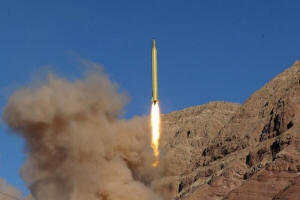|
 Iran
says missiles for self defense, tests do not violate nuclear deal Iran
says missiles for self defense, tests do not violate nuclear deal
 Send a link to a friend
Send a link to a friend
[March 15, 2016]
By Matt Siegel
CANBERRA (Reuters) - Iran's foreign
minister said on Tuesday that its ballistic missiles were for
self-defense and that recent tests condemned by the United States did
not violate an historic nuclear deal between Tehran and six world
powers.
|
|
 Speaking in Australia, Mohammad Javad Zarif said that the missiles
tested last week would never be used in aggression. The tests drew
international concern and prompted a meeting on Monday of the
15-nation United Nations Security Council. Speaking in Australia, Mohammad Javad Zarif said that the missiles
tested last week would never be used in aggression. The tests drew
international concern and prompted a meeting on Monday of the
15-nation United Nations Security Council.
"These missiles do not even fall within the purview of 2231 and they
are not illegal," he told reporters, referring to the council
resolution, adopted in July, that endorsed the nuclear deal.
"Iran will never use any means to attack any country, including our
missiles. These are only for our defense. I challenge those who are
complaining about Iran's missile program ... to make the same
statement," he added.
The United States on Monday vowed to continue pushing for U.N.
Security Council action on the ballistic missile tests and accused
Russia of looking for reasons not to respond to what is says are
Iranian violations of the resolution.
 U.S. Ambassador Samantha Power was referring to comments from
Russian Ambassador Vitaly Churkin, who said that in the view of
veto-wielding Russia, Iran's ballistic missile tests did not violate
resolution 2231.
The resolution "calls upon" Iran to refrain from certain ballistic
missile activity. Western nations see that as a clear ban, though
council diplomats say China and other council members agree with
Russia's and Iran's view that such work is not banned.
Zarif, speaking in Canberra following meetings with Australian
Foreign Minister Julie Bishop and Prime Minister Malcolm Turnbull,
strongly echoed Churkin's language.
[to top of second column] |

Bishop told reporters that she had raised the issue of the missile
tests with Zarif during a private meeting and that Australia refused
to rule out an investigation in the Security Council.
"It is Australia's position that should the United Nations Security
Council wish to investigate this matter, then that would be the
proper legal process for it to do so," she told reporters.
Australia also said on Tuesday that it would re-open a trade office
in Iran after a recent lifting in sanctions created commercial
opportunities between the two nations.
Mining equipment, technology and services and agricultural
commodities were cited as potential areas of trade in a statement
released by Steven Ciobo, Minister for Trade and Investment.
(Additional reporting by Cecile Lefort in SYDNEY; Editing by Kim
Coghill)
[© 2016 Thomson Reuters. All rights
reserved.]
Copyright 2016 Reuters. All rights reserved. This material may not be published,
broadcast, rewritten or redistributed.
 |